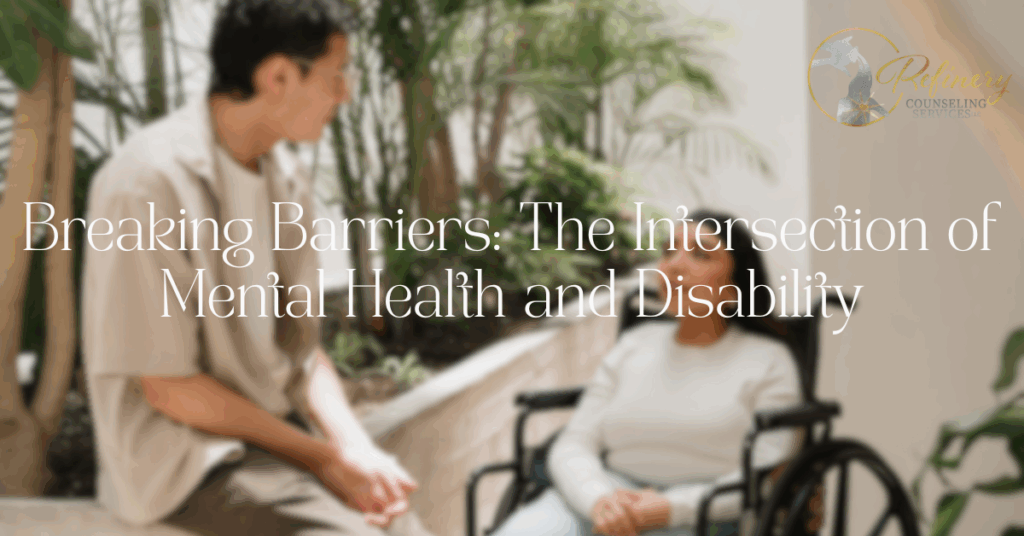Disability and mental health are deeply intertwined yet too often treated as separate issues in care, advocacy, and everyday conversation. For millions living with visible and invisible disabilities, mental health is not a side note—it is integral to daily life. Understanding how these realities intersect allows us to offer more compassionate support and more effective care.
This article explores the connection between mental health and disability, the barriers that persist, and how we can respond with dignity, empathy, and meaningful action. It also stands as a cornerstone in our broader conversation about inclusive mental health.
Understanding the Intersection
The term “disability” covers a wide range of conditions—physical, intellectual, sensory, and psychological. According to the CDC, about 1 in 4 adults in the U.S. lives with some form of disability. Many experience co-occurring mental health concerns like depression, anxiety, PTSD, or chronic stress.
The lived experience of disability often includes:
- Stigma and social isolation
- Chronic stress and trauma from navigating inaccessible environments
- Limited access to care due to financial, physical, or structural barriers
- Higher vulnerability to abuse or neglect
These compounding factors increase the risk of mental health challenges and highlight the need for holistic, accessible support.
Our article, Therapy 101: What to Expect in Your First Session, shares how mental health support can serve as a steady and empowering companion in navigating complex realities.
The Weight of Double Stigma
Individuals with disabilities often face stigma on two fronts: societal attitudes toward disability and societal misunderstandings about mental health. A person using a mobility device who experiences depression may be told to “stay positive” rather than being offered support. Someone with a cognitive disability might have their emotional distress dismissed altogether.
These responses can reinforce isolation and prevent individuals from seeking help. That’s why breaking mental health stigma, particularly in marginalized communities, is so critical. As we noted in Breaking the Stigma: Why Mental Health Matters for Everyone, recognizing vulnerability as strength is a necessary cultural shift.
A Faith-Integrated Lens
At Refinery Counseling Services, we affirm the dignity of every person, regardless of ability or diagnosis. Our Christian faith reminds us that strength is often found in places the world overlooks. Struggles with mental health are not signs of weakness—they are invitations to grace, healing, and connection.
For people with disabilities, especially those who have experienced rejection from faith communities or institutions, therapy that honors both faith and lived experience can offer deep restoration.
Inclusive Mental Health Tools
While support strategies should always be personalized, there are accessible tools that benefit many:
- Accessible Counseling Options
Therapists offering telehealth, sensory-friendly environments, or disability-competent care make a significant difference. Inclusive counseling practices are a necessary starting point for equity.
- Peer-Led Community Spaces
Groups facilitated by individuals with lived experience of disability can foster deep connection, reduce isolation, and support emotional regulation.
- Mindfulness and Spiritual Practices
Tools like breathwork, prayer, or grounding techniques can be adapted to each person’s needs and beliefs. Emotional resilience often begins in quiet moments of reflection.
- Self-Advocacy as a Form of Healing
Naming what you need—and believing you are worthy of receiving it—is an act of emotional resilience. These values are reflected in How to Build Emotional Resilience: A Guide for Men, which speaks to reclaiming one’s voice and agency.
Structural Inequities Still Present
Despite growing awareness, many individuals with disabilities still encounter:
- Health systems that don’t integrate mental health with disability support
- Therapists lacking training in disability competency
- Emergency response teams that misread behavioral crises
These failures are not just gaps in care—they are breaches in dignity. Our systems must evolve to meet people where they are, with understanding and empathy.
Strength in Every Story
Recognizing the emotional weight that can accompany disability doesn’t mean diminishing a person’s strength. It means honoring that strength in all its forms—especially when it takes the shape of asking for help, advocating for change, or simply making it through another difficult day.
Mental health support should not be a luxury. It is a basic right. And for those living with disabilities, that support must be both accessible and respectful.
Moving Forward
As we reflect during Disability Pride Month and beyond, may we continue to challenge the systems and assumptions that leave people out. Listening, learning, and standing in solidarity are not just ethical choices—they are healing ones.
At Refinery Counseling Services, we are committed to walking alongside individuals with disabilities, providing care that is inclusive, faith-rooted, and clinically sound. Mental health is not for some. It is for everyone.

